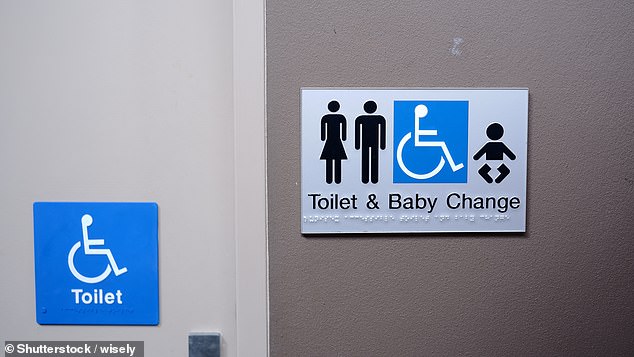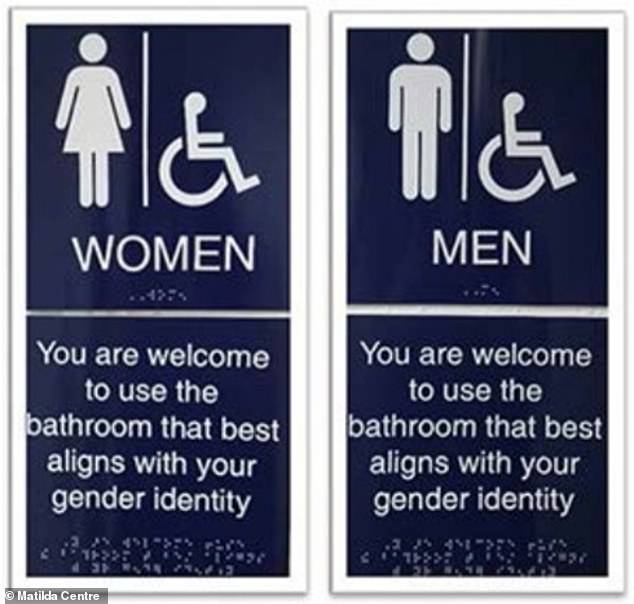Radical change to public bathrooms is slammed as ‘inappropriate’ after solution to ‘toilet anxiety’ sparked backlash
Trans and gender diversity advocates are calling for public toilets to become gender neutral to curb ‘toilet anxiety’ among members of the LGBTQIA+ community.
A NSW parliamentary inquiry into the design, accessibility and inclusivity of public toilets received a proposal to remove gender labeling.
A submission from six researchers called for signage on single-sex toilets to be changed to gender-neutral diagrams showing whether standing urinals or sinks are available.
It also called for menstrual products not to be allocated to a gender-specific facility, arguing “not all people who menstruate are women and not all women menstruate.”
The University of Sydney is among advocates urging the state government to overhaul public toilets. Studies claim that the current model forces transgender and gender diverse people to use a restroom that does not reflect their identity.
The university’s submission to the study also added that trans and gender diverse people felt “uncomfortable, unsafe or anxious” when entering public toilets.
It proposed that ‘all gender/gender-neutral toilets are provided consistently and equitably in all public settings, particularly in schools and other educational settings, sports and recreational settings and workplaces’.
The university also proposed designating all single-stall restrooms and showers as “all gender/gender neutral through simple but explicit signage.”
Trans and gender diversity advocates are calling for public toilets to become gender-neutral cubicles to curb ‘toilet anxiety’ among members of the LGBTQIA+ community (pictured, Bondi Beach public toilet block)

A submission from six surveys called for signage to be changed in male and female toilets (pictured)
“Gender neutral signage should be usage-based diagrams that explain what facilities are available within the toilet facility,” the submission said.
“Remove and avoid all identity-based bathroom signage and icons.”
This would allow people to make an “informed decision” about whether the toilet facility meets their needs, the university argued.
Local councils in NSW manage the majority of public toilets and often have the autonomy to make decisions about signage and regulation.
Last year, Sydney’s Inner West Council adopted a strategy to promote gender-neutral signage.
The Inner West Council claimed gender-based toilets created ‘toilet fear’ for gender diversity and transgender people have been subjected to ‘harm or threats of violence’ when entering same-sex male toilets.
The submissions received a strong response, with some council mayors strongly opposed to the idea of gender-neutral toilet blocks.
Fairfield Mayor Frank Carbone strongly opposed the changes, claiming they would be “inappropriate” in his municipal area.

The photo shows an example of a single-sex bathroom sign stating that all people are welcome to use the restroom facility that best reflects their gender identity
“Gender diversity toilets may work in the inner city, but in the West we say no because we know what our community wants and that is men’s and women’s facilities,” Mr Carbone told us. The Daily Telegraph.
‘We have facilities where children’s sports are played and I think it would be extremely confronting if people were in different gender bathrooms. I think it’s inappropriate.’
Local government NSW, which represents all councils in the state, backed a move towards more inclusive language and gender-neutral toilets.
“The move towards gender-neutral facilities is a further step forward in recognizing the diverse and changing needs of our community,” the submission said.
“The National Building Code, which sets out the requirements for bathrooms, uses binary language that typically carries over to information and signage for those facilities.”
However, the submission argued that gender-neutral toilets should not come at the expense of facilities for women and men.
It also warned against excluding men’s and women’s facilities from sports grounds, saying they are needed to accommodate male and female sports.
Inquiry hearings are scheduled for early 2025 before recommendations are made to the state government on whether changes should be made to public toilets.
